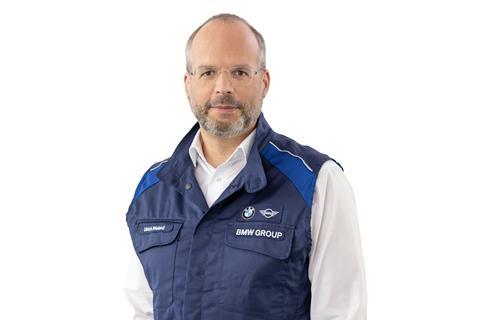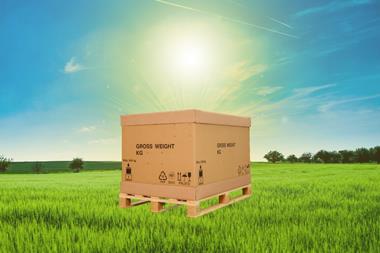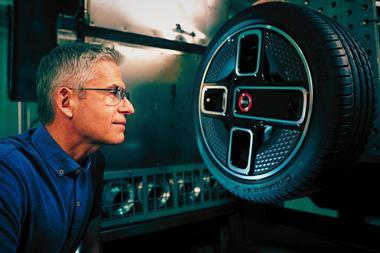Dr Ulrich Wieland will lead logistics and production control for BMW’s Spartanburg plant, as Oliver Bilstein takes over overseas supply, responsible for consolidation and packaging across global kits and parts shipments.

BMW Group has rotated leadership within its central supply chain management team for managing global logistics and parts flows, vehicle programme planning, as well as in the US for the carmaker’s largest global plant in Spartanburg, South Carolina. The changes put new leadership in charge of some of the carmaker’s most critical and complex logistics operations as BMW invests in new production and supply chains, including adding manufacturing of new electric vehicles and battery packs, and expanding assembly in overseas regions, such as south-east Asia.
As of September 1, Dr Ulrich Wieland will take over as vice-president of production control, logistics and material control at BMW Manufacturing Co – the local entity in the US that includes the plant’s production, logistics and export operations. He will be responsible for regional programme planning for Spartanburg, along with material flows, physical logistics, inbound transport and vehicle logistics from the plant, including vehicle exports.
Wieland was most recently vice-president of plant allocation and programme planning, where he helped determine the models that each plant produces across BMW’s global production network, and planning output that meets customer orders based on the optimal mix of production, supply and logistics capacity. Wieland, who joined BMW in 2014, has previously held roles in production digitalisation, and led the company’s global vehicle logistics (he spoke to Automotive Logistics when in the role back in 2015). Prior to BMW he held leading roles in operations and logistics at a variety of industrial and automotive companies.
Wieland replaces Oliver Bilstein in Spartanburg, who has held the role for the past three years and helped to oversee operations through pandemic disruptions and semiconductor shortages, during which time the plant maintained high levels of production, whilst also preparing to build a new electric SUV series and a new battery pack plant. He spoke to Automotive Logistics last year as part of in-depth series on Spartanburg’s supply chain, and at the 2023 Automotive Logistics & Supply Chain Global Conference in Dearborn, Michigan, where he highlighted localisation and digitalisation strategies for the plant.

Bilstein will be based at BMW’s headquarters in Munich as vice-president of overseas supply. In this role, he will be responsible for the consolidation, packaging and export of knockdown kits and components from key plants and packing centres in Germany, China, Mexico and the US – including two facilities at Spartanburg – which ship to more than 30 plants globally.
The overseas operation is an important one for BMW in localising assembly of key models in global regions and includes complex packaging and freight coordination. The kits and parts are for assembly of models in regions where there may not yet be full-cycle production or supplier localisation; it’s a logistics strategy that helps BMW to expand its reach and reduce custom duties in markets with growth potential, for example Thailand (where the company is also expanding battery production), Malaysia, India and Brazil.
Last month, BMW completed a second-phase expansion of a global parts centre in Shenyang, China, which supports parts consolidation for manufacturing and export.
Oliver Bilstein has been with BMW for more than 25 years in roles across manufacturing, corporate planning, model allocation and logistics, including three years in China leading production projects for the BMW Brilliance joint venture, and in charge of logistics at the carmaker’s Munich plant.
Bilstein will report to Dr Michael Nikolaides, senior vice-president of production network and supply chain management. In Spartanburg, Ulrich Wieland will report directly to Dr Robert Engelhorn, president and CEO of BMW Manufacturing, and as the logistics lead for a major operation, will be part of the carmaker’s logistics leadership network, which is also headed by Nikolaides.

BMW at Automotive Logistics & Supply Chain Global in Dearborn
BMW’s Dr Ulrich Wieland will join a panel at the 2024 Automotive Logistics & Supply Chain Conference in Dearborn, Michigan this September 24-26, focused on ‘Resiliency in action – global lessons in lean, green and smart logistics’.
Spartanburg’s logistics perform to high levels even as they are transformed
Ulrich Wieland joins Spartanburg during one of the most dynamic phases for production and logistics in the plant’s 30-year history. The factory produces more than 1,500 models daily across 10 different variations of X model crossover and SUVs, including coupé versions, petrol, diesel and plug-in hybrids. It is a fast-paced, complex operation with high part variety, including nearly 35,000-part numbers and 1,400 daily trucks at the plant. BMW has recently opened a new logistics centre, and earlier this year opened its first press shop at the plant, whilst launching the new X3 crossover this summer.
The plant’s logistics operations are also set to change significantly with the addition of electric vehicle and battery production. BMW’s $1.7 billion investment in Spartanburg will see the first of a new electric SUV roll off the assembly line in 2026, with significant construction already underway to extend logistics and assembly areas. In 2023, it began construction of a new battery assembly plant near to the plant in Woodruff, South Carolina, which will build BMW’s sixth generation battery with cylindrical cells sourced from an AESC gigafactory in Florence, South Carolina.
BMW Plant Spartanburg parts supply chain in numbers
These products will drive new logistics flows and processes. For example, BMW is developing specialised handling equipment to automate loading of the battery packs on trucks, which will deliver just-in-sequence to the assembly plant.

BMW is updating its Spartanburg plant
But Spartanburg is especially notable for producing at close to full capacity at the same time as it rebuilds and expands the plant. In an interview last year with Automotive Logistics, Oliver Bilstein said that this situation put considerable pressure on logistics and material control teams to “perform while we are transforming”.
For example, construction at the plant has displaced some existing trailer yards and logistics space. Assembly and logistics halls are sometimes divided by temporary walls separating active operations and construction areas. “We have to prepare and implement these new projects at the same time that we are fully utilised,” said Bilstein. “Overall, our biggest challenge will be to manage this change and still reach our output targets.”
Wieland, who has previously helped steer strategy and digitalisation in BMW’s production, including the design of production and logistics systems, will oversee an operation with significant focus on digitalising and automating logistics and material handling. The plant has implemented new fleets of smart transport robots (STRs) and autonomous tugger trains, for example, and is exploring advanced robotics for logistics. In material control, real-time tracking and transport monitoring is combined with artificial intelligence-based predictions of risk and optimisation.Digital twin of production halls, meanwhile, are used to help design assembly and logistics flows for new models and layouts.
In 2023, BMW Manufacturing produced more than 410,000 vehicles and exported more than 225,000 vehicles, at a value of more than $10.1 billion.


























![Global[1]](https://d3n5uof8vony13.cloudfront.net/Pictures/web/a/d/s/global1_726550.svgz)













No comments yet